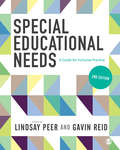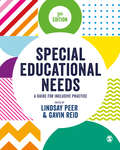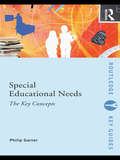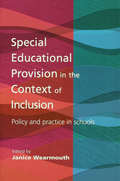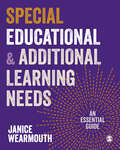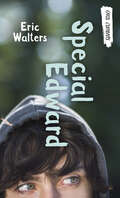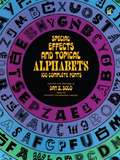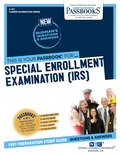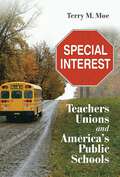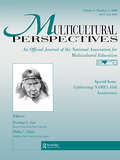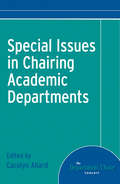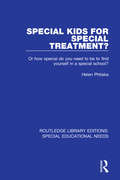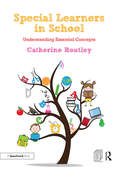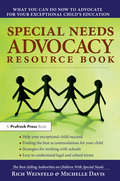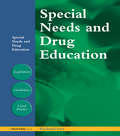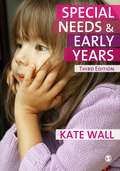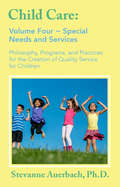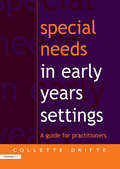- Table View
- List View
Special Educational Needs: A Guide for Inclusive Practice
by Gavin Reid Lindsay PeerCovering contemporary policy issues, perspectives from practice and a range of common syndromes and barriers Special Educational Needs presents a wealth of information and guidance for students and professionals on how to achieve effective, inclusive practice. Second edition features include: · fully revised annotated further readings and links to useful websites; · a new chapter on Autism and Applied Behaviour Analysis (ABA) · a new chapter on Down Syndrome · updated reference to legislation, including the SEND Code of Practice (2014) · updated case studies covering 0-18 age range This comprehensive course text is ideal for students, teachers, practitioners and specialists, and provides a solid foundation for understanding and supporting learners with additional needs.
Special Educational Needs: A Guide for Inclusive Practice
by Gavin Reid Lindsay PeerCovering contemporary policy issues, perspectives from practice and a range of common syndromes and barriers Special Educational Needs presents a wealth of information and guidance for students and professionals on how to achieve effective, inclusive practice. Second edition features include: · fully revised annotated further readings and links to useful websites; · a new chapter on Autism and Applied Behaviour Analysis (ABA) · a new chapter on Down Syndrome · updated reference to legislation, including the SEND Code of Practice (2014) · updated case studies covering 0-18 age range This comprehensive course text is ideal for students, teachers, practitioners and specialists, and provides a solid foundation for understanding and supporting learners with additional needs.
Special Educational Needs: A Guide for Inclusive Practice
by Gavin Reid Lindsay PeerThis guide to inclusive practice covers contemporary policy issues, perspectives from practice and specialist guidance from across a wide range of common syndromes. Bringing together the important combination of theory, knowledge and practice, each chapter is written by experts from fields within Special and Additional Educational Needs. This third edition includes new chapters on: - The current context of SEN current context: in research and practice - Speech, language and communication - The role and use of technology in supporting learners with SEND - Pathological/Extreme Demand Avoidance (PDA/EDA) - Working together - Children and Young People’s Perspectives Providing a solid foundation for understanding and supporting learners with additional needs, this comprehensive text is ideal whether you are a student, teacher or education practitioner.
Special Educational Needs: A Guide for Inclusive Practice
by Gavin Reid Lindsay PeerThis guide to inclusive practice covers contemporary policy issues, perspectives from practice and specialist guidance from across a wide range of common syndromes. Bringing together the important combination of theory, knowledge and practice, each chapter is written by experts from fields within Special and Additional Educational Needs. This third edition includes new chapters on: - The current context of SEN current context: in research and practice - Speech, language and communication - The role and use of technology in supporting learners with SEND - Pathological/Extreme Demand Avoidance (PDA/EDA) - Working together - Children and Young People’s Perspectives Providing a solid foundation for understanding and supporting learners with additional needs, this comprehensive text is ideal whether you are a student, teacher or education practitioner.
Special Educational Needs: The Key Concepts (Routledge Key Guides)
by Philip GarnerExploring the complex issues that surround special educational needs (SEN) both in and out of the classroom, this reader-friendly text considers the impacts that these issues have upon the child, the parent, the teacher, and the school as a whole. Fully cross-referenced and including suggestions for further reading with each entry, areas discussed include: pupil rights and empowerment parents and care workers curriculum and teaching inclusive approaches historical dimensions. Providing an informative combination of practical, historical and legal terms and concepts, Special Educational Needs: The Key Concepts is a highly useful resource accessible to a broad audience.
Special Educational Provision in the Context of Inclusion: Policy and Practice in Schools
by Janice WearmouthThis text traces the development of special educational provision and goes on to concentrate on some of the key issues relevant to professionals currently working in the field. It looks at the recent drive towards inclusion and the implication this has for schools. In the present market-oriented context in education, there are a number of dilemmas facing schools that attempt to include all pupils and at the same time respond to the current focus on academic achievement in a national climate of competition and accountability. The book offers practical examples of ways to resolve these dilemmas at the level of the LEA, the school, the classroom and the individual child. Part One gives an overview of special and inclusive education, current thinking around issues related to equal opportunities, and how this affects schools. It also illustrates how one Local Education Authority has tried to promote a policy of inclusion in its schools. Part Two includes a discussion of the challenges facing teachers in schools who attempt to put current national policies related to inclusion into practice and provides practical examples of whole-school and classroom initiatives to support the learning of groups of pupils and individuals within them. Included are chapters on professional development for teachers of special educational needs, classroom strategies for teacher and pupil support teachers and advice on differentiation, OFSTED and inclusive schools, the SENCO in the secondary school, and equal opportunities for all. This book will appeal to all teachers, SENCOs, head teachers and governors in every sector of the education system, parents, academics and course members on teachers' continuing professional development courses.
Special Educational and Additional Learning Needs: An Essential Guide
by Janice WearmouthThis essential text supports students to develop their understanding of children and young people with special educational, and additional support needs. Up to date with the current Code of Practice and legislation, the text offers chapters on each key area of need within Early Years settings, schools and colleges, empowering readers with the confidence to address these needs effectively. The book includes case studies and examples helping to put theory into practice, in addition to learning and teaching points throughout the book, encouraging students to think critically of how they would manage particular issues. Janice Wearmouth is Professor of Education at the University of Bedfordshire.
Special Educational and Additional Learning Needs: An Essential Guide
by Janice WearmouthThis essential text supports students to develop their understanding of children and young people with special educational, and additional support needs. Up to date with the current Code of Practice and legislation, the text offers chapters on each key area of need within Early Years settings, schools and colleges, empowering readers with the confidence to address these needs effectively. The book includes case studies and examples helping to put theory into practice, in addition to learning and teaching points throughout the book, encouraging students to think critically of how they would manage particular issues. Janice Wearmouth is Professor of Education at the University of Bedfordshire.
Special Edward: (special Edward) (Orca Currents)
by Eric WaltersEdward is a classic slacker. He's got better ways to spend his time than toiling over homework, and as long as he gets passing grades he's happy. When his fifty percent average is threatened he has to find a way to pull up his grades without applying himself. Edward discovers that special education students get more time to complete tests, and he thinks he's found the perfect scam. Little does he know that manipulating everyone around him will take more work than he ever imagined. Also available in French.
Special Effects and Topical Alphabets (Lettering, Calligraphy, Typography)
by Dan X. SoloThe alphabet is the message. With these special effects and topical alphabets, you can advertise or identify a product or service in lettering that reinforces your message. For example: letters shaped like chopsticks; letters made up of logs; letters made up of bones; letters frozen in ice; letters with stars and stripes.These are just a few of the alphabets you can use from the 100 fonts selected by Dan X. Solo from the Solotype Typographers Catalog. All the fonts appear in upper case, while many also have lower case and/or numerals.Whether your message is about the Fourth of July, cool refreshment, outdoor life, modern technology, summer, spring, winter, or a hundred other moods and occasions, you'll find in this collection an alphabet that tells the story. The typographic designs may be sophisticated or naïve, but all are eminently useful and difficult to find in usual sources.
Special English Workbook class 10 - MP Board
by madhya pradesh rajya shiksha kendra bhopalThis is the work book special english 10th standard book from Madhya pradesh rajya shiksha kendra bhopal in english.
Special English Workbook class 12 - MP Board
by Madhya Pradesh Rajya Shiksha Kendra BhopalSpecial English text book for 12th standard from Madhya pradesh rajya shiksha kendra bhopal in english.
Special English Workbook class 9 - MP Board
by madhya pradesh rajya shiksha kendra bhopalThis is the work book special english 9th standard book from Madhya pradesh rajya shiksha kendra bhopal in english
Special Enrollment Exam: Passbooks Study Guide (Career Examination Series)
by National Learning CorporationThe Special Enrollment Exam (IRS) Passbook® prepares you for your test by allowing you to take practice exams in the subjects you need to study. It provides hundreds of questions and answers in the areas that will likely be covered on your upcoming exam.
Special Interest
by Terry M. MoeWhy are America's public schools falling so short of the mark in educating the nation's children? Why are they organized in ineffective ways that fly in the face of common sense, to the point that it is virtually impossible to get even the worst teachers out of the classroom? And why, after more than a quarter century of costly education reform, have the schools proven so resistant to change and so difficult to improve?In this path-breaking book, Terry M. Moe demonstrates that the answers to these questions have a great deal to do with teachers unions-which are by far the most powerful forces in American education and use their power to promote their own special interests at the expense of what is best for kids.Despite their importance, the teachers unions have barely been studied. Special Interest fills that gap with an extraordinary analysis that is at once brilliant and kaleidoscopic-shedding new light on their historical rise to power, the organizational foundations of that power, the ways it is exercised in collective bargaining and politics, and its vast consequences for American education. The bottom line is simple but devastating: as long as the teachers unions remain powerful, the nation's schools will never be organized to provide kids with the most effective education possible.Moe sees light at the end of the tunnel, however, due to two major transformations. One is political, the other technological, and the combination is destined to weaken the unions considerably in the coming years-loosening their special-interest grip and opening up a new era in which America's schools can finally be organized in the best interests of children.
Special Interest: Teachers Unions and America's Public Schools
by Terry M. MoeWhy are America's public schools falling so short of the mark in educating the nation's children? Why are they organized in ineffective ways that fly in the face of common sense, to the point that it is virtually impossible to get even the worst teachers out of the classroom? And why, after more than a quarter century of costly education reform, have the schools proven so resistant to change and so difficult to improve?In this path-breaking book, Terry M. Moe demonstrates that the answers to these questions have a great deal to do with teachers unions--which are by far the most powerful forces in American education and use their power to promote their own special interests at the expense of what is best for kids.Despite their importance, the teachers unions have barely been studied. Special Interest fills that gap with an extraordinary analysis that is at once brilliant and kaleidoscopic--shedding new light on their historical rise to power, the organizational foundations of that power, the ways it is exercised in collective bargaining and politics, and its vast consequences for American education. The bottom line is simple but devastating: as long as the teachers unions remain powerful, the nation's schools will never be organized to provide kids with the most effective education possible.Moe sees light at the end of the tunnel, however, due to two major transformations. One is political, the other technological, and the combination is destined to weaken the unions considerably in the coming years--loosening their special-interest grip and opening up a new era in which America's schools can finally be organized in the best interests of children.
Special Issue: A Special Issue of multicultural Perspectives
by Philip C. Chinn Penelope L. LisiFirst Published in 2000. Routledge is an imprint of Taylor & Francis, an informa company.
Special Issues in Chairing Academic Departments (The Department Chair #23)
by Carolyn AllardChairing an academic department comes with a multitude of responsibilities in a wide variety of areas. As a new department chair, you immediately confront many of the basics of academic leadership: managing budgets, supporting faculty, resolving conflict, and facilitating change, to name a few of the topics covered in The Essentials for New Department Chairs, the companion to this booklet. This collection is designed to help you navigate the further intricacies of your role. Bringing together in one place for the first time sound advice and proven strategies from experts in the field, these articles from The Department Chair provide practical tips on such topics as post-tenure review, work-life balance for faculty, fundraising, departmental planning, and preparing your administrative résumé. Every selection contains easily accessible strategies and advice that you can put to use immediately. The range of articles covers the important functions of academic departments, and the authors impart the skills and thinking you need to enhance your leadership capabilities. For brand-new department chairs this booklet will provide you with an overview of the complexities of the chair role. For those chairs with a year or two more experience this booklet will provide direction and guidance as you delve more deeply into your responsibilities. Designed to provide a wealth of strategies in five crucial areas?faculty recruitment and evaluation, faculty mentoring and development, enhancing teaching and building community, departmental initiatives, and chair development and next steps?the expert advice and field-tested techniques presented here offer essential insights into this important chair work. This collection will equip you with lessons to draw from and best practices for leading into the future.
Special Kids for Special Treatment?: Or how special do you need to be to find yourself in a special school? (Routledge Library Editions: Special Educational Needs #42)
by Helen PhtiakaFirst published in 1997. This book compares and contrasts the experiences of deviant pupils in a mainstream school with that of those in a special unit for pupils with behavioural problems. The author’s aims are to (i) evaluate the differences between the behaviour of deviant boys and girls within the mainstream education system with those without; and (ii) justify the criteria for transferring deviant pupils to special units. Her research shows that there is no uniformity in the deviant behaviour of pupils in either situation. In fact, there are more similarities in the behaviour of pupils across the dividing line than pupils in the same institution. Such findings raise questions about the apparent arbitrary nature if some transferral decisions and, in the longer term, the whole logic of separate schooling for pupils who are considered by some to be a problem. At a time when market forces and competition have distracted the schools’ attention away from the needs of the individual pupil, this book stresses the need for changes at all levels which will make school relevant to the lives of all pupils.
Special Learners in School: Understanding Essential Concepts
by Catherine RoutleyOffering a wealth of photocopiable resources for use with individual children or small groups, Special Learners in School provides a step-by-step programme to help practitioners support children with a range of special educational needs, and develop the skills which are fundamental to their learning in the mainstream classroom. Competencies including active listening and observation skills, memory, comprehension of pattern and sequencing, positional and expressive language, body awareness and emotional intelligence are all key to ensuring a child’s access to the school curriculum. Recognising that these can be particular areas of difficulty for pupils with SEND, this book provides a range of activities designed to engage and gradually develop children’s use of auditory and visual memory, pragmatic and sensory skills. Easily accessible and differentiated for children at lower and upper levels of ability, practical examples and activities can be used immediately, or be adapted in line with students’ abilities and progress. This will be an invaluable source of inspiration and activites for learning support assistants, teaching assistants, teachers and SENCOs looking to support children in mainstream schools as they develop skills fundamental to their learning.
Special Needs Advocacy Resource
by Rich Weinfeld Michelle DavisSpecial Needs Advocacy Resource Book: What You Can Do Now to Advocate for Your Exceptional Child's Education is a unique handbook that teaches parents how to work with schools to achieve optimal learning situations and accommodations for their child's needs. From IEPs and 504 Plans, to IDEA and NCLB, navigating today's school system can be difficult for even the most up-to-date, education-savvy parent. Special needs advocates Rich Weinfeld and Michelle Davis provide parents and professional advocates with concise, easy-to-understand definitions and descriptions of legal terms and school regulations, along with checklists, tips, questionnaires, and other tools.Topics covered in this handy guide include gathering accurate information about a child's education, navigating school meetings, understanding education law, and best practices in the classroom, working effectively with parents and school systems, discovering educational options beyond the standard, and much more. Parents and advocates not only will feel informed by Weinfeld and Davis' vast knowledge of the inner workings of the school system—they'll be empowered to help their kids succeed in school.Educational Resource
Special Needs and Drug Education (nasen spotlight)
by Richard IvesTaking drugs is complex and there are concerns about the best ways of addressing drugs issues in schools - particularly for pupils with special educational needs. Many teachers are worried about discussing drugs with their pupils. They fear that they know too little and that some of their pupils may know too much. They also worry that talking about drugs to naive children may raise their interest. Yet the government expects all pupils to receive drug education and requires all schools to have a drug policy. It has ambitious targets in reducing the use of drugs by young people. This book aims to help teachers of pupils with special educational needs to assess what their contribution should be and identify what the particular issues associated with their pupils are. It will help schools to: create or revise a drugs policy plan a program of study deliver drug education appropriate to their pupils deal with drug related incident.
Special Needs and Early Years: A Practitioner Guide
by Kate WallIn the third edition of this respected and influential textbook, Kate Wall blends theory and practice with an informative and highly accessible writing style to provide a detailed analysis of provision for young children with additional needs. New to this edition are: - up-to-date information on all the relevant policies and legislation, including the Early Years Foundation Stage (EYFS), Every Child Matters (ECM) and the training guidelines for new SENCOs; - a timeline showing the development of policies and legislation in the field; - learning objectives at the beginning of chapters; - points for reflection within chapters, to aid independent study and facilitate critical thinking; - new case studies, which cover the Birth to 8 age range; - new content on the role of fathers, pupil voice and listening to children, taking an holistic view of the child, and current issues around diversity and inclusion. This book is essential reading for early years students and practitioners, and for all those working with young children with special educational needs and their families.
Special Needs and Services: Philosophy, Programs, and Practices for the Creation of Quality Service for Children
by James A Rivaldo Ph.D. Stevanne Auerbach Jeannette WatsonSpecial Needs and Services examines and supports parent participation, training programs, role of play in the physical, mental and social development of children, and community involvement as the basis for effective childcare programs. Includes perspectives from different cultures and needs when considering the delivery of services. This valuable volume provides views on historical, political issues; social, economic needs; and essential insights and trends reported from direct professional and personal experiences in diverse locations and provides guidance for future directions. Foreword by Jeanette Watson, former Director, Early Childhood Development Division, Texas Department of Community Affairs. Contributors include Docia Zavitkovsky, Ida M Bucher, Francione Lewis, Lucille Gold, Carol Hardrove, Dollie Wolverton, Elsa Ten Broeck, Lottie Rosen, James A. Johnson, Jr., Oscar Uribe, Mila Pascual, Roderick Auyang, Daniel Safran, Patricia Siegel, Dr. Joan M. Bergstrom, Gwen Morgan and Dr. Stevanne Auerbach.
Special Needs in Early Years Settings: A Guide for Practitioners
by Collette DrifteThis book provides reader-friendly, easy-to-access information about the Special Educational Needs Code of Practice and what it means for the Early Years practitioner. It prunes away the jargon and 'legal-speak' of the DfEE documents, allowing the busy teacher to easily focus on the aspects they want to explore. It also contains practical suggestions and advice regarding the day-to-day classroom management of a special needs child and details on how to actually implement the requirements of the Code of Practice. Teachers working in the Early Years and all those working in private nurseries and non-maintained Early Years settings should find this book enormously helpful.
